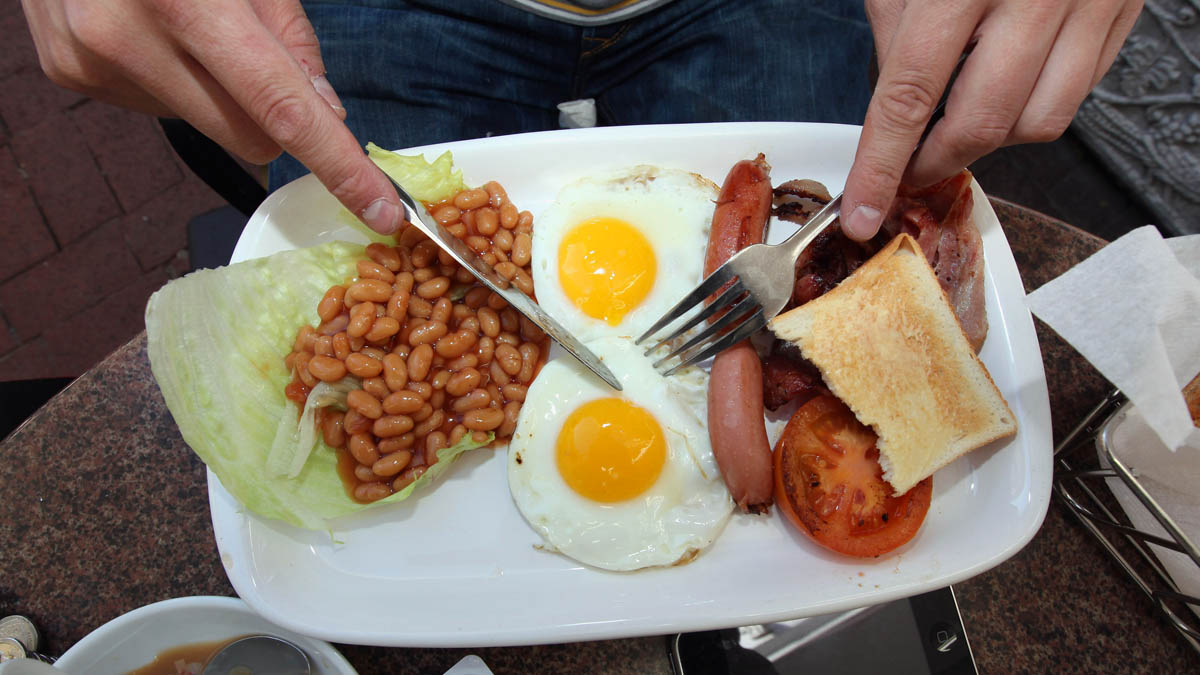Bacon, sausages and ham do cause cancer, WHO confirms
Processed meats will now be classed as carcinogens, alongside tobacco, alcohol and asbestos

A free daily email with the biggest news stories of the day – and the best features from TheWeek.com
You are now subscribed
Your newsletter sign-up was successful
Processed meats such as bacon, sausages and ham can cause cancer in humans, the World Health Organisation (WHO) has concluded for the first time.
Global health experts at the International Agency for Research on Cancer have classed processed meats as carcinogens, placing them in the same category as tobacco, alcohol and asbestos.
However, the organisation does not compare the level of risk associated with each product in a category – meaning a chunk of chorizo is not as bad for a person's health as a cigarette.
The Week
Escape your echo chamber. Get the facts behind the news, plus analysis from multiple perspectives.

Sign up for The Week's Free Newsletters
From our morning news briefing to a weekly Good News Newsletter, get the best of The Week delivered directly to your inbox.
From our morning news briefing to a weekly Good News Newsletter, get the best of The Week delivered directly to your inbox.
"The risk of developing bowel cancer because of their consumption of processed meat remains small, but this risk increases with the amount of meat consumed," said the WHO's Dr Kurt Straif.
The report warns that consuming just 50g of processed meat a day is enough to raise a person's risk of developing bowel cancer by 18 per cent. A typical fry-up containing two rashers of bacon and two sausages makes up almost three times that amount, at 130g, according to the [1] Daily Telegraph.
Red meat, which has been linked to pancreatic and prostate cancer, was labelled "probably carcinogenic" and placed in a lower category than processed meat due to limited evidence.
Cancer charities have welcomed the report but it is being fiercely contested by members of the meat industry who attended the meeting, [2] The Guardian reports.
A free daily email with the biggest news stories of the day – and the best features from TheWeek.com
"It was clear that many of the panellists were aiming for a specific result despite old, weak, inconsistent, self-reported intake data," said the North American Meat Institute.
Cancer Research UK said it supported the WHO's classification, which was based on decades of research. "We’ve known for some time about the probable link between red and processed meat and bowel cancer, which is backed by substantial evidence," said Professor Tim Key.
But he said the findings did not mean that people needed to stop eating red and processed meat altogether. "Eating a bacon bap every once in a while isn't going to do much harm – having a healthy diet is all about moderation."
Robert Pickard, a member of the Meat Advisory Panel and emeritus professor of neurobiology at the University of Cardiff, suggested there were more significant ways people could cut their cancer risk.
"The top priorities for cancer prevention remain smoking cessation, maintenance of normal body weight and avoidance of high alcohol intakes," he said.
-
 What to know before filing your own taxes for the first time
What to know before filing your own taxes for the first timethe explainer Tackle this financial milestone with confidence
-
 The biggest box office flops of the 21st century
The biggest box office flops of the 21st centuryin depth Unnecessary remakes and turgid, expensive CGI-fests highlight this list of these most notorious box-office losers
-
 The 10 most infamous abductions in modern history
The 10 most infamous abductions in modern historyin depth The taking of Savannah Guthrie’s mother, Nancy, is the latest in a long string of high-profile kidnappings
-
 Home Office worker accused of spiking mistress’s drink with abortion drug
Home Office worker accused of spiking mistress’s drink with abortion drugSpeed Read Darren Burke had failed to convince his girlfriend to terminate pregnancy
-
 In hock to Moscow: exploring Germany’s woeful energy policy
In hock to Moscow: exploring Germany’s woeful energy policySpeed Read Don’t expect Berlin to wean itself off Russian gas any time soon
-
 Were Covid restrictions dropped too soon?
Were Covid restrictions dropped too soon?Speed Read ‘Living with Covid’ is already proving problematic – just look at the travel chaos this week
-
 Inclusive Britain: a new strategy for tackling racism in the UK
Inclusive Britain: a new strategy for tackling racism in the UKSpeed Read Government has revealed action plan setting out 74 steps that ministers will take
-
 Sandy Hook families vs. Remington: a small victory over the gunmakers
Sandy Hook families vs. Remington: a small victory over the gunmakersSpeed Read Last week the families settled a lawsuit for $73m against the manufacturer
-
 Farmers vs. walkers: the battle over ‘Britain’s green and pleasant land’
Farmers vs. walkers: the battle over ‘Britain’s green and pleasant land’Speed Read Updated Countryside Code tells farmers: ‘be nice, say hello, share the space’
-
 Motherhood: why are we putting it off?
Motherhood: why are we putting it off?Speed Read Stats show around 50% of women in England and Wales now don’t have children by 30
-
 Anti-Semitism in America: a case of double standards?
Anti-Semitism in America: a case of double standards?Speed Read Officials were strikingly reluctant to link Texas synagogue attack to anti-Semitism